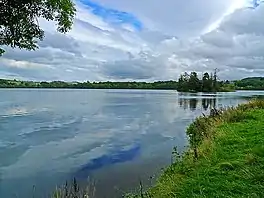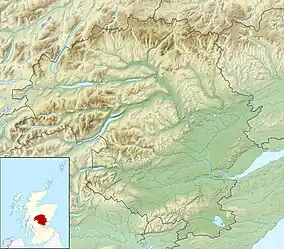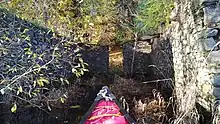Loch of Clunie
Loch of Clunie is a small lowland freshwater loch that is located two miles (three kilometres) west of Blairgowrie, Perth and Kinross, Scotland.[1][2][3]
| Loch of Clunie | |
|---|---|
 Loch of Clunie. The island on the right (which is thought to be man made) contains the ruins of Clunie Castle. | |
 Loch of Clunie | |
| Location | NO063781 |
| Coordinates | 56.5810°N 3.4436°W |
| Type | freshwater loch |
| Primary inflows | Lunan Burn from Loch of Butterstone |
| Primary outflows | Lunan Burn into Loch of Drumellie |
| Max. length | 410 m (1,350 ft)[1] |
| Max. width | 205 m (673 ft)[1] |
| Surface area | 50.6 ha (125 acres)[2] |
| Average depth | 8.8 m (29 ft)[1] |
| Max. depth | 21 m (69 ft)[1] |
| Water volume | 4,821,400 m3 (170,265,000 cu ft)[1] |
| Shore length1 | 3.2 km (2.0 mi) [2] |
| Surface elevation | 47 m (154 ft)[2] |
| Max. temperature | 16.8 °C (62.3 °F) |
| Min. temperature | 8.4 °C (47.2 °F) |
| Islands | 1 |
| 1 Shore length is not a well-defined measure. | |
Clunie Castle

The Loch of Clunie has a single island, said to be artificial, which has the remains of Clunie Castle.[4][5] The house was designed as a simple L-plan tower house and was built by George Brown Bishop of Dunkeld between 1485 and 1514 as a spiritual retreat.[4] A chapel was dedicated to St Catherine in the house in 1507.[4] The island is surrounded by a dry-stone wall and there is a well designed pier at the south-end of the island, that was constructed in 1512–1513.[4] The house was burnt down in a fire and was restored at the end of the 18th Century.[4] It is now currently a ruin as the roof fell in in 1989 and was never rebuilt.
References
- John, Murray; Lawrence, Pullar. Bathymetrical Survey of the Fresh-Water Lochs of Scotland, 1897-1909 Lochs of the Tay Basin Volume II - Loch of Clunie. National Library of Scotland: National Challenger Officer. p. 103. Retrieved 11 January 2019.
 This article incorporates text from this source, which is in the public domain.
This article incorporates text from this source, which is in the public domain. - "Loch of Clunie". Centre for Ecology and Hydrology. Scotland and Northern Ireland Forum for Environmental Research (SNIFFER). Retrieved 14 June 2020.
- The Topographical, Statistical, and Historical Gazetteer of Scotland: A-H. Vol. A–H. Edinburgh: A. Fullarton and Co. 1845. p. 229.
- "Loch Of Clunie". Canmore. Historic Environment Scotland. Retrieved 21 September 2022.
- The New Statistical Account of Scotland: Perth. Vol. X. Edinburgh and London: William Blackwood and Sons. 1845. p. 1024.